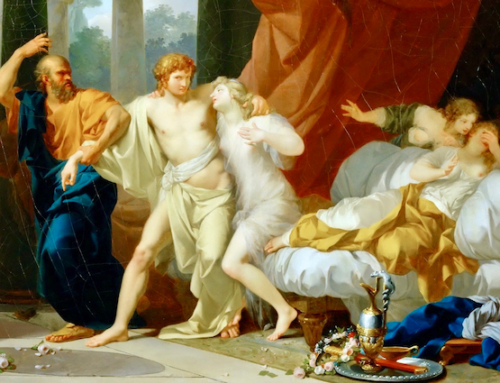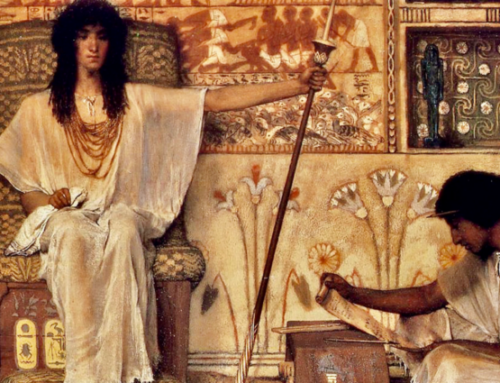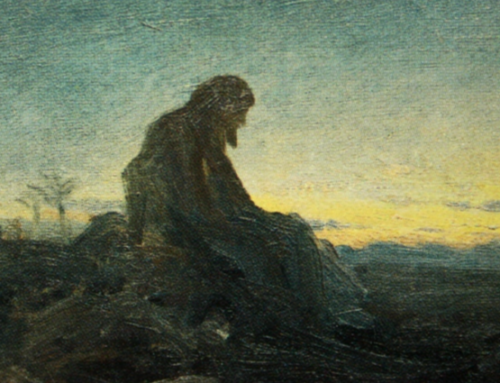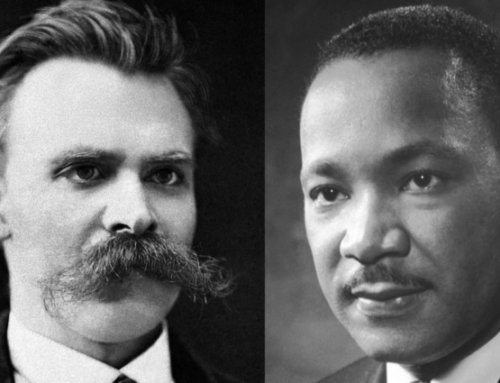Contemplation is nothing else than this: a loving gaze between a lover and the one loved. To be people of leisure requires that we are people of contemplation. If we are, we will experience a foretaste of heaven.
 As the school year is well underway, it may be worthwhile to examine the role which leisure plays in our lives. Although we all value our vacation time and enjoy moments of relaxation, leisure in its truest form seems to be a forgotten practice in this day and age.
As the school year is well underway, it may be worthwhile to examine the role which leisure plays in our lives. Although we all value our vacation time and enjoy moments of relaxation, leisure in its truest form seems to be a forgotten practice in this day and age.
To begin, when an attempt is made to be at leisure, there are many distractions which prohibit its practice. Some of these include the constant stimulation with technology to which we subject ourselves. Because of this, we are often out of touch with reality, and not experiencing the joys which creation brings. This results in taking people, situations, and the objects around us for granted. The stress and busyness of our schedules, whether of a continuous work schedule or with the extra activities we impose upon ourselves, often lead to stressful lives and much unhappiness.
Though this misery is never the intended outcome of any of the decisions that we make, perhaps we need a reminder of what it means to be at leisure. After all, it is not merely the individual who suffers due to a lack of leisure. Society as a whole is affected, for, as the German philosopher Josef Pieper famously noted, leisure is the basis of culture.
Before we examine what leisure entails, it is important to note what leisure is not. Leisure is not a planned vacation. A vacation entails more work than merely finding oneself a free afternoon without plans. Also, leisure cannot merely be defined as “relaxing” by indulging in non-work-related activities such as playing games, watching movies, hiking, or even spending quality time with friends and family. Similarly, leisure cannot solely be understood as a day off from work or the sudden acquisition of free time. In his book Only the Lover Sings, Pieper notes that any attempt to “organize ‘relaxation’” creates “an even more hectic, indeed an outright desperate, form of work.” For him, leisure must be defined in another manner: in accordance with contemplation.
Contemplation has always been associated with seeing. It is the seeing beyond what the human mind can comprehend. It allows us to know, in a deeper way, divine realities. This is why the philosophers always understood contemplation to be the highest activity of man, for it allows him to enter into the divine on earth in the pursuit of understanding universal truths.
In developing this link between contemplation and leisure, Pieper quotes Anaxagoras, a pre-socratic philosopher, who was asked, “Why are you on earth?” Anaxagoras responded, “To behold.” This relates to man’s end: to behold the face of God. The psalmist confirms this, saying that he makes only one request of God: “to behold the beauty of the Lord” (Psalm 27:4). Contemplation is nothing else than this: a loving gaze between a lover and the one loved. This, in fact, is an integral part of our nature. We are made to be at rest when we contemplate, for, in so doing, we partake in an activity most fitting for us. This, in turn, gives us peace and happiness.
Thus, leisure invites us to behold more than just meets the physical eye. In Leisure: The Basis of Culture, Pieper likens leisure to “the stillness in the conversation of lovers, which is fed by their oneness… And as it is written in the Scriptures. God saw, when ‘He rested from all the works that He had made’ that everything was good, very good (Genesis 1:31), just so the leisure of man includes within itself a celebratory, approving, lingering gaze of the inner eye on the reality of creation.” Just as God rested by contemplating the goodness of His creation, we experience true leisure by contemplating God’s goodness. Thus, leisure must be always linked with contemplation, that is, a loving gaze upon God.
However, in order to experience leisure in its essence, we must first seek Truth, encounter silence, experience wonder, and learn how to contemplate. In his City of God, Saint Augustine speaks of leisure as the pursuit of, or the discovery of, truth. Therefore, in order to be at leisure, we need to desire the Truth and to actively seek it. Any pursuit of the truth, as St. Theresa Benedicta of the Cross reminds us, is a quest for God whether realized or not, because all aspects of truth reflect the goodness of the Divine Truth. Thus, unless we recognize that Truth is unchanging and is found in God alone, a sense of leisure cannot be restored to society.
The pursuit of Truth requires silence. In an ever-advancing, self-determining society the concept of silence is becoming rare. Technology seems to supersede human communication and becomes more addictive to each rising generation. This in turn leads to a series of personal and societal problems in which we become immersed: addiction, anxiety, depression, distorted views of reality, the inability to communicate, and poor health. This is why for leisure to be possible and for Truth to be pursued, society must first “unplug” from gadgets in order to foster wonder and experience the joys of contemplation.
Silence further fosters leisure as it causes self-reflection and a certain openness and understanding of ourselves and the world about us. Pieper remarks that “leisure is not the attitude of the one who intervenes but of the one who opens himself up; not of someone who seizes but who lets go, who lets himself go, and ‘go under,’ almost as someone falling asleep must let himself go.” This concept is crucial to grasp, for leisure is only possible when we surrender our desire for control and allow ourselves to be open to the situations around us and to be open to God’s grace.
Once this openness has been reached, we will be at peace. Pieper reflects that leisure, in its purest form, takes place when we are at peace with ourselves and the rest of creation. He writes: “Leisure is only possible in the assumption that man is not only in harmony with himself [whereas idleness is rooted in the denial of this harmony], but also in the agreement with the world and its meaning. Leisure lives on affirmation.” This peace with God, oneself, and others is an essential foundation to experiencing true leisure, for only then will we be at rest.
Silence and peace in turn inspire wonder and contemplation. The world of wonder unlocks aspects of humanity and creation in such a way that we cannot see or fathom unless we take the time to immerse ourselves in its beauty. This sense of wonder is normally initiated by an encounter with what is Good, True, and Beautiful. Wonder inspires a healthy inquisitiveness which causes us to seek answers to universal questions. It instills in us a certain stillness as we stare in complete awe at the beauty by which we are surrounded. Wonder further causes a self-indulgent and self-seeking society to overcome its vices so as to touch the divine. Thus, wonder sets the stage for contemplation, which is essential to the act of leisure.
Contemplation is vital to leisure because the latter is, according to Pieper, a “condition of the soul.” This is why it is essential for humanity to experience peace and wonder, for contemplation only takes places when the soul is at peace and when man is transcended outside of himself and into the divine.
In his 2007 homily at Saint Stephen’s Cathedral in Vienna, Pope Emeritus Benedict XVI reflected on the importance of a Christo-centric leisure. He noted that “if leisure time lacks an inner focus, an overall sense of direction, then ultimately it becomes wasted time that neither strengthens or builds us up.” Benedict XVI continued saying that leisure “requires a focus—the encounter with Him who is our origin and goal.” This is supported by Scripture. After Jesus sees the weariness of his followers, he tells the apostles to “come to a deserted place all by yourselves and rest a while” (Mk. 6:31). It is by taking time to be in silence and separate themselves from the crowds that the apostles will begin to be at rest. At another time, Jesus invites all to “come to him, all you who labor and are heavy burdened and I will give you rest” (Mt. 11:28). Only Christ brings true leisure.
Only after discovering true leisure for ourselves can its effects transform society, for leisure and contemplation inspire the arts, one of the bases by which we understand culture. In Only the Lover Sings, Pieper writes:
Whenever the arts are nourished through festive contemplation of universal realities and their sustaining reasons, there in truth something like liberation occurs: the stepping-out into the open under an endless sky, not only for the creative artist himself but for the beholder as well, even the most humble. Such liberation, such foreshadowing of the ultimate and perfect fulfillment, is necessary for man, almost more necessary than his daily bread, which is indeed indispensable and yet insufficient.
The arts, fostered by contemplation, inspire wonder in those who experience it. Wonder in turn incites a contemplative leisure and a desire to pursue beauty in its truest form.
It is perhaps this practice of leisure which, fostered by contemplation, inspired Michelangelo’s magnificent Sistine Chapel or the Pietà. This same practice may have caused Bernini’s design of St. Peter’s colonnade to reflect the universality of the Church. Similarly, the Ghent altarpiece can only have resulted from the tranquility of a soul immersed in the contemplation of the liturgy and the sacrifice of the cross. This same wonder, brought on by a contemplative leisure, may have inspired countless architects in designing the magnificent cathedrals of old. Leisure made real for composers such as Mozart, Vivaldi, and Verdi, the spiritual realities of life, death, and resurrection. These truths in turn are conveyed through their compositions and handed down to generations to contemplate through music. These great works and countless others cause us to marvel at their beauty and provoke in us our own contemplative musings.
We have done ourselves a great disservice by succumbing to hectic schedules. By doing so, we have forgotten both the importance and the true meaning of leisure. To be people of leisure does not mean having all commodities of life at our disposal, nor does it merely entail enjoying time off from work. To be people of leisure requires that we are people of contemplation. If we are, we will experience what Pieper identifies as a foretaste of heaven. Only then will we be truly at rest, invariably leading to great cultural achievements and civic renewal.
Republished with gracious permission from Crisis Magazine (September 2018).
The Imaginative Conservative applies the principle of appreciation to the discussion of culture and politics—we approach dialogue with magnanimity rather than with mere civility. Will you help us remain a refreshing oasis in the increasingly contentious arena of modern discourse? Please consider donating now.
The featured image is “Lovers” (1869), by Pál Szinyei Merse, and is in the public domain, courtesy of Wikimedia Commons.







Leave A Comment